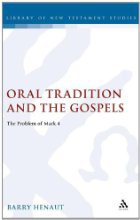 Let’s continue with this series that I left hanging nearly a year ago now. . . .
Let’s continue with this series that I left hanging nearly a year ago now. . . .
We’re looking at the way oral tradition has been assumed to lie behind many of the Gospel narratives about Jesus and at the arguments that have been marshaled to support that assumption. We are basing these posts upon the published version of a the doctoral thesis by Barry W. Henaut, Oral Tradition and the Gospels: The Problem of Mark 4.
The last post in the series finished with:
To the one who has ears, Hear!
Ancient literature was mostly written to be read aloud for the ear.
Rabbis apparently even opposed silent reading since hearing the sounds of the words was thought to aid memory and guard against distortions of meaning.
But this raises a problem for the models of faithful oral transmission.
If ancient literature was primarily a medium for the ear, and the authors of this literature constructed their texts to appeal to the ear, then how can we be sure that what they are writing is the original word that has come down to them? Or what hope have we of knowing that at no point of the oral transmission did someone change the original words to make the idea more palatable to the ear?
We move on now to Henaut’s discussion of another landmark scholar in the field of oral vis à vis textual gospel studies, Werner Kelber. Kelber raised serious questions about the models that had been proposed by Bultmann and Gerhardsson who were discussed in the earlier posts. (Bultmann and Gerhardsson had argued that sayings of Jesus had a particular Sitz im Leben (each saying had its own particular social setting) and that communities were repositories of oral traditions and safeguarding their long-term consistency. Continue reading “Oral Tradition Taken for Granted (continued)”

